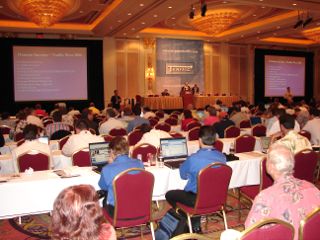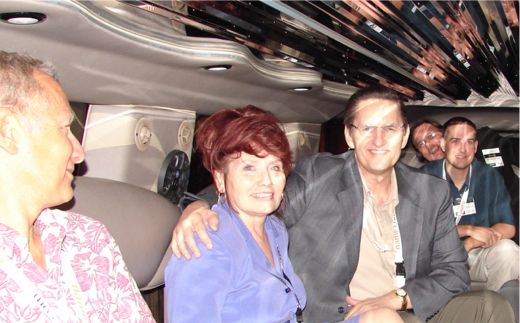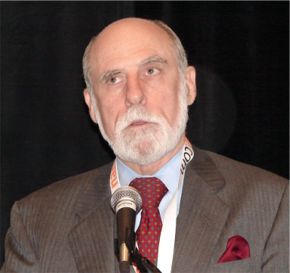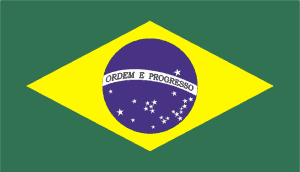|
T.R.A.F.F.I.C.
West 2006 Highlights
I
just returned from the largest domain industry
gathering held to date, the T.R.A.F.F.I.C. West
conference at the spectacular Venetian Hotel in Las
Vegas. 502 people came from around the world to
learn more about the business, network with industry
leaders, discuss partnerships and buy or sell domains. We
will be publishing a complete conference wrap up
Thursday evening (May 11). However, as I wrote you soon
after I arrived in Las Vegas, I wanted to give our
newsletter subscribers a sneak peak at what happened
during the show (which is why the newsletter is arriving
a few days later than usual this month)! The
highlights included the biggest live domain auction ever
held, an event in which $2.1 million worth of
domains were sold in just 3 hours, including the highest
.net sale ever reported, Sex.net, at $450,000. |

Scene
from historic live domain auction
at T.R.A.F.F.I.C. West 2006 in Las Vegas |
The many
seminar sessions included a special opening day shootout
featuring representatives from nine different PPC companies.
Each tried to make a case for why their service was the best for
monetizing domains. A networking session followed that allowed
everyone present to meet 24 people before the event ended. After
the sun went down, a centerpiece of every T.R.A.F.F.I.C.
conference, the DomainSponsor Party, was held at the
exclusive GhostBar on top of the Palms Hotel.
DomainSponsor arranged for a fleet of Hummer limousines
to whisk attendees across town for the big bash. The
photo below was snapped inside one limo headed to the party.
Shown left to right are Howard Hoffman (PPCIncome.com), Diana
Jackson and Ron Jackson (DNJournal.com), noted
attorney John Berryhill and Jay Westerdal (Name
Intelligence.com). Actually, Dr. Berryhill's body is at the
far right, but through some unusual contortions his head is to
the left of Westerdal's! 
| Once at the
Palms, an elevator took us up 55 floors to the famous
night club (featured on MTV) that features an
outdoor patio with a a spectacular view of the Las Vegas
skyline. The event ran until 3am, which accounted for an
unusually low turnout at breakfast Thursday morning!
The second day of
business included three more seminars, including one
featuring heavyweights from the financial community.
We'll have details on all of these sessions in our
conference wrap up later this week.
Most of the afternoon
Thursday was devoted to the live auction. As big as the
sales were there, some even larger ones were worked out
in private rooms during the week. We know of one, which
we may be allowed to announce soon, involving a
two-letter domain that is changing hands for $1.6
million. |

View
of Las Vegas
snapped from the GhostBar patio
during DomainSponsor Party at The Palms |
T.R.A.F.F.I.C.
ended with a Friday morning breakfast, a meeting of the World
Association of Domain Name Developers board of directors
(where plans for future conferences were discussed) and a poker
tournament which I knew enough to stay out of for my own good!
It was another great event, as was the Domain
Roundtable conference two weeks ago in Seattle. These
special events have helped propel the industry to heights that
were unimagined just 18 months ago. It's my hope that you can
all attend one sooner or later. Even if it means saving up your
nickels and dimes and taking your vacation time to do it, I am
confident it will be time and money well spent.
Don't
Believe Everything You Read I
was scheduled to speak at the T.R.A.F.F.I.C. conference
Thursday afternoon (May 4) on "Sales Trends in the Domain
Market". However a Washington Post newspaper article
that I received soon after landing in Las Vegas, prompted me to
change the topic of my talk at the last minute. I felt that the
errors and misrepresentations in this article (which appear to me
to have been intentional) required me to warn both individuals and
company executives about what can happen when dealing with
reporters and editors that take their responsibilities as
journalists lightly (or even worse, who adulterate their news
reporting with dishonest tactics aimed at delivering a message
they decide will be delivered regardless of the
truth). The
boom in the domain market has triggered a sudden surge of
mainstream media interest in the industry. This started with
articles in the Wall Street Journal and Business 2.0
magazine less than six months ago. Since then many other outlets
have gotten on the bandwagon including USA Today, who
put an article about the domain boom on the front page of their
widely circulated publication last month. Until the Post article
last week, I have been very pleased to see generally accurate and
fair reporting on this business.
|

Maybe
the reporter had her fingers crossed when telling me what
her story was about. |
Print
outlets have been bleeding readers and advertisers to the
Internet in a trend that appears to be unstoppable. Even
so, quality publications have stuck to sound journalistic
principles and avoided skewing their news coverage to
attack this new medium that threatens their existence.
They know that is a line you cannot cross if you want to
maintain your credibility. My
experience with the Post leads me to believe they do not
respect that line. Reporter Leslie Walker called me
and told me she was doing a story on "the boom in the
domain market". That was false. The story turned out
to be about something completely different - the issue of
trademark sensitive domains appearing in Google
search results. Now, there is nothing wrong with doing a
story on that topic, but it is not all right to do an
interview on a completely different subject, then take the
responses you get and drop them into an article about
something else to make it look like someone supports your
premise when they do not. |
As
a professional journalist for more than 20 years, I've seen things
taken out of context before, but never to this extent. During an
hour-long interview, Walker asked me only one question about
misuse of trademark-related domains. That was "what do people
in the industry think about the practice?" I told her it was
frowned on as it made the vast majority (who invest in generic
domains) look bad. The rest of our discussion was about generic
domains and how they are monetized. I
explained that many of the pioneers saw this opportunity
a decade ago and invested millions of dollars to build the
portfolios they now hold. They did that at considerable risk in
the face of people who told them they were fools. I noted that
finally, some of those pioneers are now reaping the rewards of
their remarkable foresight by, in some cases, earning millions
from their investments. In the article I appeared to be making a
flippant comment, "I know several guys making over a million
dollars a year from advertising on their domains!" As if it
was all easy money that the recipients didn't deserve. No mention
of the millions they invested nor of their seeing the opportunity
years before anyone else dreamed of it.
|
Even
worse, immediately after my quote, the writer inserted a
comment from a Los Angeles attorney making it appear that
he was responding to my statement when he is quoted as
saying "the practice amounts to someone making money
off someone else's trademark without permission." We
were talking about two completely different things
in two separate interviews. That is simply dishonest
reporting, aimed at making all domain investors look bad.
In my opinion it is unconscionable for a journalist to do
that and it is the sort of thing that the term yellow
journalism was coined to describe. |
 |
So
what can you do to avoid such situations? Learn which publications
and reporters you can trust to tell the truth. If they forfeit
their credibility with this kind of willful deceit I would never
trust what they write on any topic. Does it mean I will stop
talking to the mainstream press? Of course not, because the
message we have to get it out is too important to stifle because
of one bad incident. The public needs to know that domain
investors are no different than investors in any other asset,
whether it be stocks, bonds, real estate or anything else. They
risk their capital with the hope of making a return on their
investment, just like everyone else.

Internet
pioneer Vint Cerf
(Chief Internet Evangelist for Google.com
and Chairman of the Board at ICANN)
speaking at 2006 Domain Roundtable |
A
lot of this lingering animosity toward domain investors
stems from a mistaken belief that the Internet was
somehow meant to be a non-profit public trust. Vint
Cerf, one of the original engineers who developed the
Internet (some even call him the "Father of the
Internet" though it is a term he detests) made this
clear when he spoke at the Domain Roundtable
conference in Seattle two weeks ago. Cerf said that he
always felt that the Internet needed to embrace commercial
activity if it was to grow. He appreciated the vision the
early domain investors showed in placing their faith in
the new medium, noting that even he never could have
imagined domains holding the financial importance they do
today.
This
is a business I am proud to be a part of. It is time to
get the domain industry's story out accurately and
banish misuse of the "cybersquatter" term (which
properly applies only to trademarked domains). Even
the Wall Street Journal used that word inaccurately in
another story last week (though I think that overall,
their coverage has lived up to the high standards they
have built their reputation on). |
We still have some distance to go, but we're getting there. The
story has just started unfolding and in the end, the truth will
prevail.
|
Industry Experts Weigh In With In-Depth Articles
If
you want to get the real story, nothing beats getting it
directly from the horse's mouth. To that end, DN Journal
occasionally runs articles written by widely recognized industry
experts. Many of you have already read the excellent series of
articles on various ccTLD's done for us by Sedo.com
managers who oversee operations in specific countries (you can
find these reports in our Articles
section).
|

Bob
Martin, CEO
Internet REIT |
In the past
week, we have added pieces from top level executives at Fabulous.com
and Internet
REIT. In the first article for a new series
called Dan Warner on Domains, the
Fabulous.com COO (who is well-known for his in-depth
industry research) talks about "Traffiic
Targeting and Wastage".
Also debuting as a guest
columnist this week is Internet REIT CEO Bob Martin with
a piece titled "The
Domain Business Gets Real". |

Dan
Warner
COO, Fabulous.com
and Dark Blue Sea |
I am going
to have to rely on these guys not to put me out of a job! Their
insight and communications skills could do that, but I'm willing
to take the risk because I believe that getting an unfiltered
industry view directly from executives at this level is invaluable
for understanding the domain business today. Domainer
in Brazil Demands Equal Time In
last month's newsletter,
I told you about how the current domain boom was creating
opportunities in other extensions. Last week I got an email from a
veteran domainer in Brazil, Gustavo Volcan Nunes. He
said the explosion in the domain market has reached his country
too and he wants people to know about it.
| Nunes wrote,
"Me and my partners lead the domain parking business
in Brazil. Right now there is almost 1 million .com.br
domain names registered in Brazil. We are getting big in the global market and
fast and many great businesses are operating here (most
coming in the last 2 years)." |

|
"Many top level domains
are being sold for high prices (and also many for very low prices)
and
several million dollars and euros are made each year with
DomainSponsor, Sedo,
DomainSpa, TrafficZ and other local companies. I'm writing because I always read your articles and I see that our market is being
completely ignored. Probably they won't even mention our country in the next
T.R.A.F.F.I.C. event in Las Vegas," Nunes said. (Editor's
note: as far as I know, he was right about that).
"Great business oportunities are going on here at this moment, top level high quality
and traffic domains are being bought for very low prices. For example, a few days ago I bought:
Musica.com.br (music) for something around $8,000
Ouro.com.br (gold) for something around $6,000
Videos.com.br (videos) was bought from one of my partners for
$13,000
 |
Me and my partners together own more than
10,000 very good domain names with high traffic. Please, make people aware of our market there in your
journal. Millions are being wasted - I mean big
opportunities! At least mention our market. Forgive any error of
English, my native language is Portuguese." No
longer any need for me to mention it Gustavo - you just
did! I had actually heard an American domainer (whose wife
is from Brazil) talking recently about the great domain
opportunities in your country, so it does look like your
secret won't be a secret much longer! |
|

